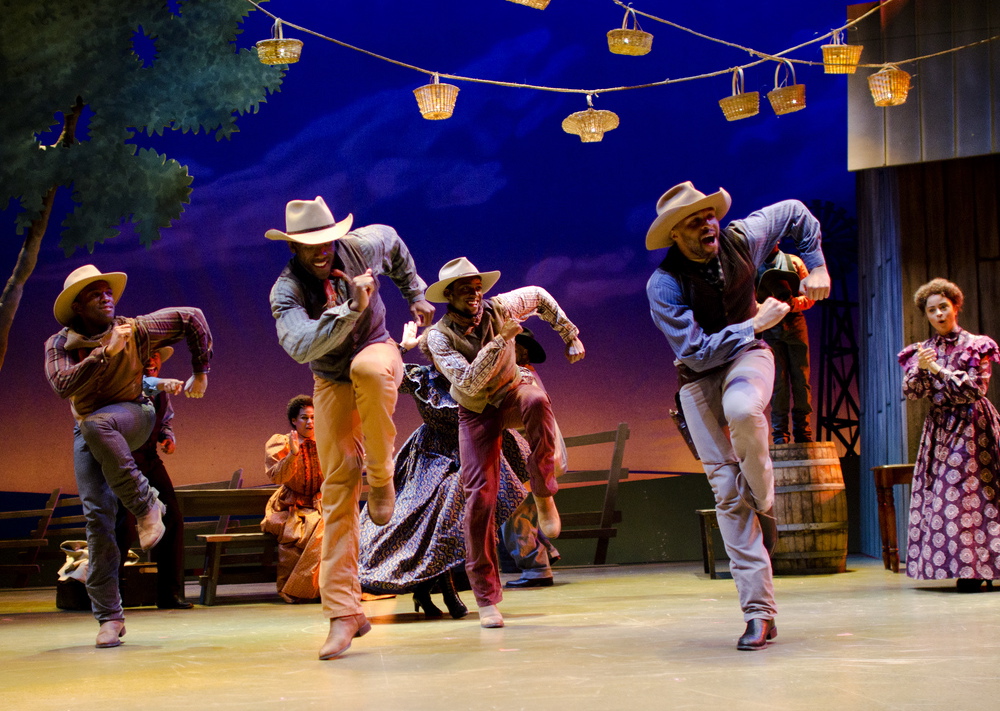 Patrick Weishampel
Patrick Weishampel
By Martha Ullman West
I’ve already expressed my outrage at the comments posted on Marty Hughley’s preview of Oklahoma! in The Oregonian that confirmed what I already knew: We are decades away from a post-racial society, whatever that means. It will be a joyful day when we celebrate our differences rather than tolerating them, like a drug reaction.
So I thought I’d go see for myself whether Portland Center Stage‘s not-quite all-black cast (Jonathan Raviv, magnificent as the Persian peddler, isn’t African-American) would change the dramatic impact of a musical I grew up with. I still own the original cast album; I still know almost all the music and lyrics by heart, and I love the ground-breaking dances, which furthered the plot rather than stopping the drama.
Original Dances by Agnes de Mille, the program says. Â Choreographer Joel Ferrell, it also says, whose dances for My Fair Lady I much enjoyed several years ago when Center Stage presented its pared-down version. For Oklahoma!, Ferrell’s choreography for the ensemble is just dandy: the clog/tap dancing of the men in Kansas City, the two-steps and waltzes for social occasions. But the cluttering-up of the Dream Ballet with, of all things, a bed and dance-hall girls of extreme vulgarity, is a huge disappointment. That’s picking up on Jud’s fascination with pornography, but it’s way over the top. And I wish Laurie’s dream double were actually a ballet dancer. Perhaps that wasn’t practical, but I suspect DeMille got that idea from Eugene Loring‘s Billy the Kid, in which Billy’s dream sweetheart is the only dancer on pointe.
Having said all that, I loved this Oklahoma! — the pace of Chris Coleman’s direction, the characterizations, the detail, the bits, the subtleties and the broadness we call dynamics. Its one flaw is the cluttered dream ballet, which I remember for its simplicity and stripped-down horror. And I especially loved Rodney Hicks’s Curly, Brianna Horne’s Laurey, and Justin Lee Miller’s Jud Fry.
*
Gregory J. Hanks, Timothy Ware, Jurran Muse and Don Kenneth Mason put some kick into “Oklahoma!” at Portland Center Stage. Photo: Patrick Weishampel.

 And on the second morning he got up, made coffee, and wrote his review, which was subsequently published (the review, not the coffee) in The Oregonian. And the review praised some and quibbled some, and was not, in the terminology of the great god Variety, boffo.
And on the second morning he got up, made coffee, and wrote his review, which was subsequently published (the review, not the coffee) in The Oregonian. And the review praised some and quibbled some, and was not, in the terminology of the great god Variety, boffo. No surprise here. With the state budget circling the toilet bowl and getting ready for the big flush, neither candidate is likely to come out promising anything to anyone about arts and culture. Remember last year, when the Democrat-dominated legislature
No surprise here. With the state budget circling the toilet bowl and getting ready for the big flush, neither candidate is likely to come out promising anything to anyone about arts and culture. Remember last year, when the Democrat-dominated legislature